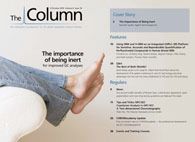New drug testing guidelines
In response to changing mandatory guidelines for federal workplace drug testing in the US, Agilent Technologies and South Bend Medical Foundation have developed new urine testing methods.
In response to changing mandatory guidelines for federal workplace drug testing in the US, Agilent Technologies and South Bend Medical Foundation have developed new urine testing methods. For the first time, the guidelines will allow for the use of liquid chromatography–triple quadrupole mass spectrometry (LC–MS–MS) for confirmatory urine drug testing.
“We frequently hear that the main barriers to adopting the new technologies required to drive laboratory productivity and/or cost reductions are lack of time and in-house expertise,” said Tom Gluodenis, Jr, Agilent worldwide forensics programme manager. “The tools we have just developed in response to the changing workplace guidelines could enable laboratories to validate these methods and be running billable urine confirmations in under 60 days.”
Use of LC–MS–MS for urine drug confirmations is reported to speed testing and reduce cost-per-sample compared with previous methods. In addition, several new target drugs have been added to the panel, several cut‑off concentrations have been adjusted, and the minimum requirements for interference testing have been satisfied for amphetamines and opiates. Also, the new requirement specifying at least 10 data points across a peak can be met.
For more information visit www.agilent.com
This story originally appeared in The Column. Click here to view that issue.

Polysorbate Quantification and Degradation Analysis via LC and Charged Aerosol Detection
April 9th 2025Scientists from ThermoFisher Scientific published a review article in the Journal of Chromatography A that provided an overview of HPLC analysis using charged aerosol detection can help with polysorbate quantification.
Analyzing Vitamin K1 Levels in Vegetables Eaten by Warfarin Patients Using HPLC UV–vis
April 9th 2025Research conducted by the Universitas Padjadjaran (Sumedang, Indonesia) focused on the measurement of vitamin K1 in various vegetables (specifically lettuce, cabbage, napa cabbage, and spinach) that were ingested by patients using warfarin. High performance liquid chromatography (HPLC) equipped with an ultraviolet detector set at 245 nm was used as the analytical technique.












